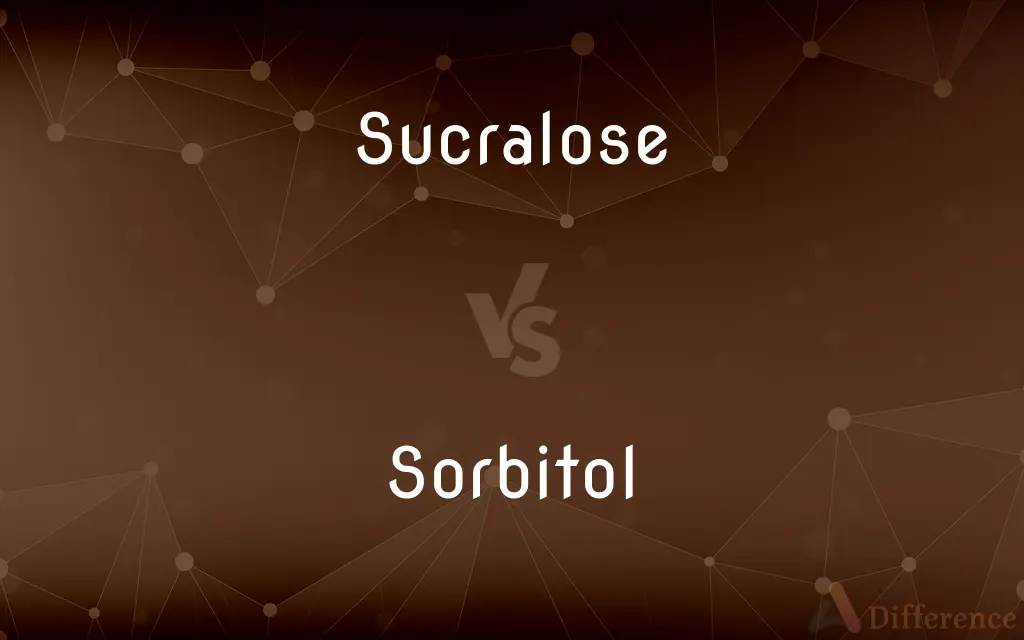Sucralose vs. Sorbitol — What's the Difference?
By Tayyaba Rehman & Urooj Arif — Updated on April 20, 2024
Sucralose is a non-caloric artificial sweetener derived from sugar, intensely sweet and heat-stable, whereas sorbitol, a sugar alcohol, offers fewer calories and a cooling taste but can cause digestive issues.

Difference Between Sucralose and Sorbitol
Table of Contents
ADVERTISEMENT
Key Differences
Sucralose, created by modifying sugar molecules, is about 600 times sweeter than sugar and does not have a significant metabolic effect, making it calorie-free. In contrast, sorbitol, naturally found in fruits, is only 60% as sweet as sugar and provides about 2.6 calories per gram, being partially metabolized by the body.
Sucralose is often used in baking and cooking due to its high heat stability, retaining its sweetness at high temperatures. Sorbitol, on the other hand, is less stable under heat and is often used in sugar-free candies and chewing gums where stability at high temperatures is not critical.
While sucralose is excreted by the body without being broken down, making it non-caloric, sorbitol is metabolized by the body, though it has a lower calorie count than regular sugar. This makes sucralose a more effective option for those managing calorie intake.
Sorbitol, due to its status as a sugar alcohol, can draw water into the intestine, potentially causing laxative effects when consumed in large amounts. Sucralose does not have this effect, making it preferable for those with sensitive digestive systems.
Sucralose has been scrutinized for potential health effects, but extensive research shows it is safe for general consumption. Sorbitol, while also considered safe, requires caution in consumption quantities due to its possible digestive side effects.
ADVERTISEMENT
Comparison Chart
Sweetness relative to sugar
600 times sweeter
60% as sweet as sugar
Caloric content
Zero calories
2.6 calories per gram
Heat stability
High (suitable for cooking and baking)
Low (used in non-heated products)
Metabolism
Not metabolized, excreted unchanged
Partially metabolized by the body
Common side effects
Rare, generally considered safe
Can cause digestive issues in large amounts
Compare with Definitions
Sucralose
An artificial sweetener made from sugar.
Sucralose is often used in diet sodas and sugar-free desserts.
Sorbitol
Used as a low-calorie sweetener.
Sorbitol is popular in sugar-free candies and gum.
Sucralose
Heat stable sweetener.
Sucralose can be used in baking cookies without losing its sweetness.
Sorbitol
A sugar alcohol derived from glucose.
Sorbitol is found naturally in apples and pears.
Sucralose
Known for being a non-caloric substitute.
Sucralose provides sweetness without the calories of sugar.
Sorbitol
Provides a cooling sensation when dissolved.
Sorbitol imparts a cooling effect in sugar-free mints.
Sucralose
Chemically modified from sucrose.
Sucralose is created by substituting three hydroxyl groups on the sugar molecule with chlorine atoms.
Sorbitol
Can have a laxative effect.
Consuming large amounts of sorbitol can lead to digestive discomfort.
Sucralose
Sucralose is an artificial sweetener and sugar substitute. The majority of ingested sucralose is not broken down by the body, so it is noncaloric.
Sorbitol
Not fully absorbed by the body.
Sorbitol is metabolized at a slower rate than sugar.
Sucralose
An intensely sweet, heat-stable derivative of sucrose that contains no calories.
Sorbitol
Sorbitol (), less commonly known as glucitol (), is a sugar alcohol with a sweet taste which the human body metabolizes slowly. It can be obtained by reduction of glucose, which changes the converted aldehyde group (−CHO) to a primary alcohol group (−CH2OH).
Sucralose
A selectively chlorinated sucrose, used as an artificial sweetener.
Sorbitol
A white, sweetish, crystalline alcohol, C6H8(OH)6, found in various berries and fruits or prepared synthetically and used as a flavoring agent, a sugar substitute for people with diabetes, and a moisturizer in cosmetics and other products.
Sorbitol
(biochemistry) A faintly sweet alcohol C6H14O6 that occurs in some fruits, is made synthetically, and is used especially as a humectant and softener and in making ascorbic acid.
Common Curiosities
Can sorbitol be used by diabetics?
Yes, sorbitol has a lower glycemic response than sugar, making it suitable for diabetics, but it should be consumed in moderation.
How does sorbitol affect digestion?
Sorbitol can draw water into the intestine, which may cause bloating and diarrhea in sensitive individuals.
Is sucralose calorie-free?
Yes, sucralose contains no calories because it is not metabolized by the body.
Is sucralose safe for everyone?
Yes, sucralose is considered safe for the general population, including diabetics, as it does not spike blood sugar levels.
Can sucralose be used in cooking?
Yes, due to its high heat stability, sucralose is ideal for cooking and baking.
How does the taste of sucralose compare to sugar?
Sucralose tastes very similar to sugar but is significantly sweeter.
What are the primary sources of sorbitol?
Sorbitol is found naturally in many fruits and is also commercially produced from glucose.
Is sucralose a natural sweetener?
No, sucralose is a synthetic sweetener derived from natural sugar.
Are there any risks associated with consuming sorbitol?
Yes, excessive consumption can lead to gastrointestinal discomfort due to its laxative effect.
What is sucralose made from?
Sucralose is a synthetic compound made by chlorinating sucrose, commonly known as table sugar.
What are the common uses of sucralose?
Sucralose is widely used in beverages, desserts, and as a table-top sweetener.
What are the benefits of sorbitol over sugar?
Sorbitol has fewer calories and does not cause a rapid increase in blood glucose levels.
Can sucralose affect dental health?
No, sucralose does not contribute to tooth decay and is considered safe for dental health.
How should sorbitol be stored?
Sorbitol should be stored in a cool, dry place away from moisture to maintain its shelf life and effectiveness.
Does sorbitol taste sweet?
Yes, sorbitol is less sweet than sugar and has a cooling taste.
Share Your Discovery

Previous Comparison
Bracer vs. Gauntlet
Next Comparison
Squeezebox vs. ConcertinaAuthor Spotlight
Written by
Tayyaba RehmanTayyaba Rehman is a distinguished writer, currently serving as a primary contributor to askdifference.com. As a researcher in semantics and etymology, Tayyaba's passion for the complexity of languages and their distinctions has found a perfect home on the platform. Tayyaba delves into the intricacies of language, distinguishing between commonly confused words and phrases, thereby providing clarity for readers worldwide.
Co-written by
Urooj ArifUrooj is a skilled content writer at Ask Difference, known for her exceptional ability to simplify complex topics into engaging and informative content. With a passion for research and a flair for clear, concise writing, she consistently delivers articles that resonate with our diverse audience.
















































